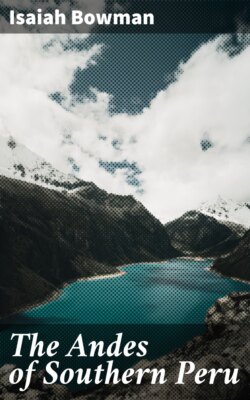Читать книгу The Andes of Southern Peru - Isaiah Bowman - Страница 7
На сайте Литреса книга снята с продажи.
The Forest Dweller
ОглавлениеOne of them I met at a rubber station on the lower Urubamba River.[1] He helped secure my canoe, escorted me hospitably to his hut, set food and drink before me, and talked of the tropical forest, the rubber business, the Indians, the rivers, and the trails. In his opinion Peru was a land of great forest resources. Moreover, the fertile plains along the river margins might become the sites of rich plantations. The rivers had many fish and his garden needed only a little cultivation to produce an abundance of food. Fruit trees grew on every hand. He had recently married the daughter of an Indian chief.
Formerly he had been a missionary at a rubber station on the Madre de Dios, where the life was hard and narrow, and he doubted if there were any real converts. Himself the son of an Englishman and a Chilean woman, he found, so he said, that a missionary’s life in the rubber forest was intolerable for more than a few years. Yet he had no fault to find with the religious system of which he had once formed a part; in fact he had still a certain curious mixed loyalty to it. Before I left he gave me a photograph of himself and said with little pride and more sadness that perhaps I would remember him as a man that had done some good in the world along with much that might have been better.
We shall understand our interpreter better if we know who his associates were. He lived with a Frenchman who had spent several years in Africa as a soldier in the “Foreign Legion.” If you do not know what that means, you have yet all the pleasure of an interesting discovery. The Frenchman had reached the station the year before quite destitute and clad only in a shirt and a pair of trousers. A day’s journey north lived a young half-breed—son of a drunken father and a Machiganga woman, who cheated me so badly when I engaged Indian paddlers that I should almost have preferred that he had robbed me. Yet in a sense he had my life in his hands and I submitted. A German and a native Peruvian ran a rubber station on a tributary two days’ journey from the first. It will be observed that the company was mixed. They were all Peruvians, but of a sort not found in such relative abundance elsewhere. The defeated and the outcast, as well as the pioneer, go down eventually to the hot forested lands where men are forgotten.
While he saw gold in every square mile of his forested region, my clerical friend saw misery also. The brutal treatment of the Indians by the whites of the Madre de Dios country he could speak of only as a man reviving a painful memory. The Indians at the station loved him devotedly. There was only justice and kindness in all his dealings. Because he had large interests to look after, he knew all the members of the tribe, and his word was law in no hackneyed sense. A kindlier man never lived in the rubber forest. His influence as a high-souled man of business was vastly greater than as a missionary in this frontier society. He could daily illustrate by practical example what he had formerly been able only to preach.
Fig. 1—Tropical vegetation, clearing on the river bank and rubber station at Pongo de Mainique. The pronounced scarp on the northeastern border of the Andes is seen in the right background.
Fig. 2—Pushing a heavy dugout against the current in the rapids below Pongo de Mainique. The indian boy and his father in the canoe had been accidentally shot.
Fig. 3—From the sugar cane, Urubanba Valley, at Colpani. On the northeastern border of the Cordillera Vilcapampa looking upstream. In the extreme background and thirteen sixteens of an inch from the top of the picture is the sharp peak of Salcantay. Only the lower end of the more open portion of the Canyon of Torontoy is here shown. There is a field of sugar cane in the foreground and the valley trail is shown on the opposite side of the river.
He thought the life of the Peruvian cities debasing. The coastal valleys were small and dry and the men who lived there were crowded and poor (sic). The plateau was inhabited by Indians little better than brutes. Surely I could not think that the fine forest Indian was lower than the so-called civilized Indian of the plateau. There was plenty of room in the forest; and there was wealth if you knew how to get at it. Above all you were far from the annoying officials of the government, and therefore could do much as you pleased so long as you paid your duties on rubber and did not wantonly kill too many Indians.
For all his kindly tolerance of men and conditions he yet found fault with the government. “They” neglected to build roads, to encourage colonization, and to lower taxes on the forest products, which were always won at great risk. Nature had done her part well—it was only government that hindered. Moreover, the forested region was the land of the future. If Peru was to be a great nation her people would have to live largely upon the eastern plains. Though others spoke of “going in” and “coming out” of the rubber country as one might speak of entering and leaving a dungeon, he always spoke of it as home. Though he now lived in the wilderness he hoped to see the day when plantations covered the plains. A greater Peru and the forest were inseparable ideas to him.
